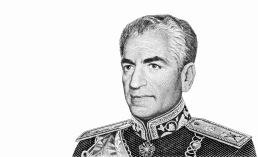The United States and its allies are toying with liberating Iran with the help of some unsavory friends.
By Jeet Heer, The Nation
Mohammad Reza Pahlavi was born to inherit a throne, groomed to govern a nation, but ended up spending almost his entire adult life as a pretender, a would-be monarch in exile nursing ambitions of restoration. Pahlavi’s fate might be pitiful if his political goals were not so obscene. For more than a century, his family has been in the thick of imperialist intrigue and coup attempts that have worked to deprive his native land of democracy and human rights. Pahlavi’s current plots to make him Iran’s ruler have brought him into alliance with an unsavory crew of authoritarians headed by US President Donald Trump, Saudi Crown Prince Mohammed bin Salman, and Israeli Prime Minister Benjamin Netanyahu. It’s this alliance that raises Pahlavi from a pathetic wannabe to a threat to peace in the Middle East and the hopes for a democratic revolution in Iran.

As royal dynasties go, the Pahlavis are parvenus. The founding father, Reza Shah Pahlavi (1878–1944), was a military officer who hijacked a democratic movement to tame the absolutist Qagar dynasty and turn the country into a constitutional republic. The Pahlavi patriarch extinguished this dream in 1925 by consolidating centralized power as the newly crowned shah. He was forced to abdicate in 1941 when his pro-German sympathies earned the ire of the Allies. His son, Mohammad Reza Pahlavi, took power that year.
In 1951, another movement for democratizing Iran, led by Prime Minister Mohammad Mosaddegh, again tried to limit the power of the monarch. Mosaddegh also pushed for the nationalization of the oil industry so that profits could benefit the Iranian people. This was unacceptable to Mohammad Reza Pahlavi’s imperial patrons, the United Kingdom and the United States. In 1953, Mosaddegh was overthrown in a CIA-orchestrated coup. which had the desired effect of entrenching Pahlavi rule as a compliant dictatorship. A CIA internal history of the coup, written in 1954, described the coup with a lyricism usually reserved for nostalgic reveries about romantic success: “It was a day that should never have ended. For it carried with it such a sense of excitement, of satisfaction and of jubilation that it is doubtful whether any other can come up to it.”
The giddy joy of US foreign-policy planners in 1953 turned to bitter gall in 1979, when the brutal dictatorship of the Pahlavi family was swept away in a revolution that was ultimately hijacked by Islamic theocrats. The revolution brought an end to decades of Western domination over Iran. For this reason, even Iranians who despise the rule of the ayatollahs and yearn for a more democratic regime are loath to make common cause with the Pahlavi project of monarchical restoration, which are rightly seen as tainted not just by the authoritarianism but also by a record of subservience to foreign powers.
Recent Posts
New Addition to List of Nuclear Near Catastrophes
February 25, 2026
Take Action Now Debris flew for great distances — many times the distance of 270 meters to a nuclear reactor and nuclear storage facility.By David…
Gavin Newsom’s last budget belies his ‘California for All’ pledge
February 24, 2026
Take Action Now Yet, even as the state is poised to lose billions in federal funding, and millions of Californians are losing access to health care…
Israel and American Hawks are Pushing U.S. to Iran War With Catastrophic Consequences
February 23, 2026
Take Action Now At the World Health Assembly in May, member states may endorse an unprecedented strategy declaring that health is not a cost – but…
A Child’s View of the Attack on Venezuela. And a Peace Flotilla
February 23, 2026
Take Action Now Fabricio said that he and his family went out of their building and saw many people also going outside, running around, and kids…




